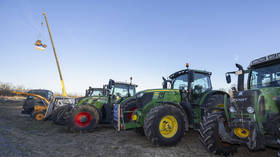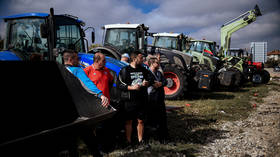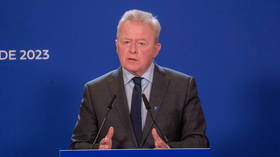EU nation’s farmers block border crossing with Ukraine

A major border checkpoint between Ukraine and Romania was blocked by the EU nation’s farmers on Saturday.
Agricultural producers have been staging protests in the area over the past few days, over continuing Ukrainian imports, which, according to the local media, have caused a “price collapse” in the entire Black Sea region.
The blockade was confirmed by the Ukrainian border service, which said on Telegram that the movement of trucks through the Siret checkpoint – which has become a major export route for Ukrainian goods into the EU – had been barred. As many as 825 vehicles were seeking to enter Romania from Ukraine at the time the border crossing was blocked, it added.
The Ukrainian authorities stated that the reason for the blockade was “unknown.” Earlier this week, the Romanian media reported that farmers from the northern part of the country had decided to block the Siret checkpoint since it was a major route for grain transit.
On Saturday evening, the Ukrainian border guard announced that the blockade had been lifted and cargo traffic through the checkpoint had resumed.
The last year has seen several major protests staged by farmers over Ukrainian grain exports to the EU. Polish agricultural producers have also blocked border crossings with Ukraine on several occasions over the same issue. The protests were largely caused by Brussels's policies toward Ukraine amid Kiev’s continued conflict with Russia.
Shortly after the start of the standoff, the EU suspended tariffs on Ukrainian exports in a bid to financially support Kiev. Cheap grain from Ukraine flowed into the EU, with farmers in neighboring countries unable to compete with the low prices of the imported goods.
The crisis forced Brussels to impose a ban on Ukrainian grain exports in May 2023, which it unilaterally lifted in September last year. Poland, Hungary, Slovakia, and Romania immediately reinstated the restrictions at a national level, prompting Ukraine to file a now-suspended complaint with the World Trade Organization. Bulgaria, which refused to join the four nations and reinstate the restrictions, faced major farmer protests in September 2023.
In January, the EU Commissioner for Agriculture, Janusz Wojciechowski, supported the idea of imposing restrictions on Ukrainian agricultural exports to the bloc. Failure to do so could trigger another “oversupply” crisis, he warned, calling the introduction of new regulations his “big task for 2024.”














